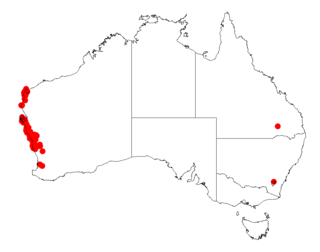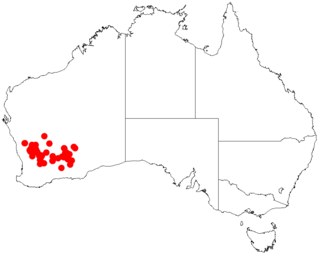
Acacia brachypoda, known colloquially as western wheatbelt wattle or Chinocup wattle, is an endangered species of Acacia restricted to a small locality in western Australia's wheatbelt.

Acacia desertorum is a shrub belonging to the genus Acacia and the subgenus Juliflorae that is endemic to western Australia.

Acacia latior is a shrub belonging to the genus Acacia and the subgenus Juliflorae that is endemic to western Australia.

Acacia sibina is a tree or shrub belonging to the genus Acacia and the subgenus Juliflorae the is endemic to parts of western Australia.

Acacia thomsonii, commonly known as Thomson's wattle, is a shrub or tree belonging to the genus Acacia and the subgenus Juliflorae that native to parts of northern Australia.

Acacia chartacea is a shrub or tree belonging to the genus Acacia and the subgenus Phyllodineae endemic to an area along the west coast of Western Australia.

Acacia ryaniana is a shrub of the genus Acacia and the subgenus Phyllodineae that is endemic to an area along the west coast of Australia.

Acacia spathulifolia commonly known as Gold carpet or the Gold carpet wattle is a shrub of the genus Acacia and the subgenus Phyllodineae that is endemic to coastal parts of western Australia.

Acacia aulacophylla is a shrub of the genus Acacia and the subgenus Plurinerves that is endemic to western Australia.

Acacia hadrophylla is a shrub of the genus Acacia and the subgenus Plurinerves that is endemic to south western Australia.

Acacia inceana is a shrub or tree of the genus Acacia and the subgenus Plurinerves that is endemic to south western Australia.

Acacia kenneallyi is a shrub or tree of the genus Acacia and the subgenus Plurinerves that is endemic to north western Australia.

Acacia nivea is a shrub of the genus Acacia and the subgenus Plurinerves that is endemic to south western Australia.

Acacia octonervia is a shrub of the genus Acacia and the subgenus Plurinerves that is endemic to a small area along the south western coast of Australia.

Acacia pharangites, commonly known as Wongan gully wattle, is a shrub of the genus Acacia and the subgenus Plurinerves that is endemic to the Wongan Hills of south western Australia and is listed as endangered according to the Environment Protection and Biodiversity Conservation Act 1999.

Acacia recurvata, commonly known as the recurved wattle, is a shrub of the genus Acacia and the subgenus Plurinerves that is endemic to a small area of western Australia.

Acacia sciophanes, commonly known as the Ghost wattle or Wundowlin wattle, is a shrub of the genus Acacia and the subgenus Plurinerves that is endemic to a small area in south western Australia. In 1995 it was declared as rare in 1995 according to the Western Australian Wildlife Conservation Act 1950 and is listed as endangered under the Environment Protection and Biodiversity Conservation Act 1999.

Acacia undosa is a shrub of the genus Acacia and the subgenus Plurinerves that is endemic to an area of south western Australia.

Acacia vittata, commonly known as Lake Logue wattle, is a shrub of the genus Acacia and the subgenus Plurinerves that is endemic to a small area in western Australia.

Acacia cretacea, also known as chalky wattle, is a shrub belonging to the genus Acacia and the subgenus Phyllodineae that is endemic to South Australia.




















